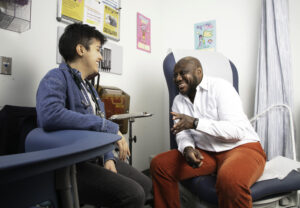Providers get creative with care to reach patients from diverse backgrounds
By Jacqueline Neber

Criss Smith at Callen-Lorde speaking with Kate Bautista, a medical provider
Criss Smith met a nurse who was also a Black queer man during his experience transitioning.
Talking to him felt like talking to an older brother, Smith said. “I could speak freely. There is a certain freedom there that you don’t get every day,” he said. “I cannot imagine even starting that conversation with someone outside of that shared experience.”
Smith’s experience at Callen-Lorde, a community health organization for New Yorkers who identify as lesbian, gay, bisexual, transgender, queer or nonbinary based in Chelsea, is an instance of culturally competent health care, a concept that centers on the idea that providers who look like patients, hail from their communities, speak their language, or even are aware of their specific cultural values, beliefs and behaviors, can facilitate better health outcomes. It can be as simple as a doctor speaking the same Spanish dialect as their patient, or a community member who has a chronic health condition teaching their neighbor how to manage their own condition.
Such care creates a more inviting and safer environment for vulnerable communities who have historically felt ostracized from the medical community, sometimes leading patients to avoid necessary care altogether. Providers have had to get creative to ensure they can meet rising demand from an increasingly diverse patient population.
When Smith first walked into Callen-Lorde, he was greeted by stickers inviting him to write out his pronouns, a signal to him that the staff cared about addressing him correctly.
Smith had also experienced “white coat syndrome,” in the past, a term used to describe the fear some patients feel around doctors who might not understand them. The doctors at Callen-Lorde, who are well aware of the source of anxiety, wear plain clothes to put their patients at ease.
The sense of comfort gave Smith the confidence to ask questions about the surgeries he was eligible for that he says he wouldn’t have had with other providers. He learned that he was eligible for top surgery, a procedure he wondered if he was too old for.
Physicians at Callen-Lorde guided Smith through the mental health aspects of his transition and made appointments for his surgeries. Since transitioning, the Jamaica-based New Yorker said the successful physical changes have helped him move through the world authentically.
“I’ve heard some stories about people having issues with being trans but thank goodness for me personally, I have not experienced that,” he said. “I have a wonderful life.”
Read the full article on Crain’s New York Business.